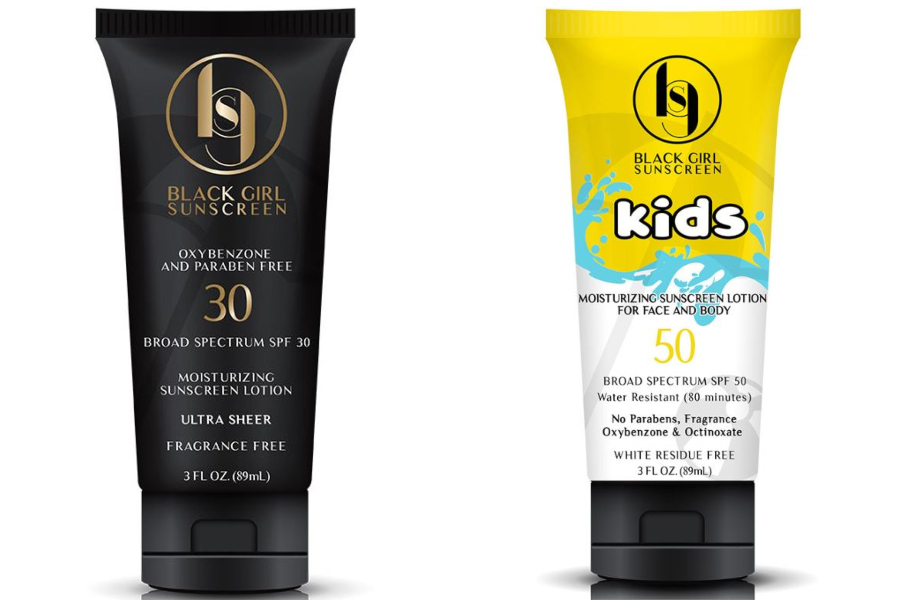
Source: Black Girl Sunscreen / Shontay Lundy
Being in the sun has always been something that Shontay Lundy has been fond of. The thirtysomething L.A. resident who spent more than a decade in Miami has loved doing outdoor activities for as long as she can remember, and for nearly that same amount of time, she’s struggled with finding the right sunscreen to protect her skin.
“I’m a woman of the sun,” she told me over the phone. “I lived in Miami for 13 years and I resided in Los Angeles for the last two years off and on. Living in these cities, you’re exposed to outdoor activities such as hiking, going to the beach and more because our climate permits us to be outside all year long. I have a diverse group of friends and I’m also from a predominately white neighborhood growing up, so I’ve seen kids wear sunscreen pretty much all my life. I was always asked, ‘Why don’t you wear sunscreen? Put this on.’ Every time I was given sunscreen, it literally looked and felt like toothpaste.”
Not only that, but Lundy said she also was always left with a white film on her skin, the same annoying purple/grayish shade that’s been left on all of our skins when we’ve tried to do the right thing and buy some Banana Boat or Coppertone and apply it before stepping out.
It wasn’t until she went on a hike with a friend and decided to Google sunscreen for people of color that she realized there was a serious hole in the market for such a product.
“There was no option for me. I was like, hmph, am I really the only person looking for a sunscreen that’s going to blend into their skin and won’t leave them looking like a ghost or silvery fish?” she said. “I was like, great, maybe I can figure this out and create something.”
The idea came in 2016, but Lundy fully started executing Black Girl Sunscreen in 2017. The product, which comes in a 30 SPF product for adults ($18.99) and a 50 SPF Kids option ($9.99) is sold at select Target locations and through their website. It came to life after some extensive research and work. For instance, Lundy chose to create a synthetic sunscreen instead of a mineral one because mineral sunscreens have zinc oxide, causing that chalky white residue. She also decided to use natural ingredients, including avocado and jojoba oil, which have great benefits compared to the contents in many sunscreens on the market, which we often can’t easily pronounce.
“Jojoba is good as an anti-inflammatory, so that reduces redness, say if you were to get burned,” she said. “It also prevents dryness in the skin, so it makes it moisturized. Being a woman of color, that’s one of our concerns. Will this product dry me out? Will it make me ashy? The jojoba comes through like a shea butter, especially with the mixture of the cacao. With the avocado, it’s great for your complexion and evening out your skin tone.”
Due to that thoughtfulness, Black Girl Sunscreen has been embraced by many, with countless reviews on its site lauding it for the moisture it provides and lack of any residue. I’ve personally tried the product and can agree that it does give your body a nice glow without a strong scent or a sticky/thick texture. You don’t have to rub it in forever to get it to set, and you definitely get proper coverage, which is important in my case due to hyperpigmentation issues.
Such matters, which are common when it comes to the skin of people of color, are why Lundy believes it’s so important that Black folks up their use of sunscreen. It is, in fact, a necessary part of any beauty regimen.
“SPF helps with fine lines and premature aging and hyperpigmentation,” she said. “Research and studies are showing that SPF is helping to retain youthful skin.”
Even the children’s sunscreen option is filled with ingredients meant to not only protect but preserve the skin. That includes chamomile, which helps with rosacea and excema, conditions that kids, who have sensitive skin, tend to deal with.
And while Lundy has a strong following already in the States with Black Girl Sunscreen, she’s taken her product, and the conversation about the benefits of using sunscreen, to Africa. She did a tour in South Africa and was approached last year about selling Black Girl Sunscreen in pharmacies in Nigeria. The demand has been incredibly high.
“The reason I was definitely interested is because this is Black Girl Sunscreen’s demographic and I think it’s really important because the naysayers of today will say, literally, ‘Our ancestors never wore sunscreen.’ And we’re like, our ancestors had a very different life span and an overall very different life. That’s not what we have today,” she said. “So I feel like being on the African continent, it shows that time is changing. We’re not trying to convince anyone that they do or don’t need sunscreen, but we are here to open up the conversation. It’s important to me to expand internationally, especially in the African continent.”
And outside of expanding where she sells Black Girl Sunscreen, Lundy is looking to expand the line as a whole. She is looking to create more face and body products, as well as provide spray-on options.
However, her overall goal is to provide something important that has been missing in the market for a demographic who major companies tend to think of last or don’t consider at all.
“We are speaking for a group of women who have been ignored for many years,” she said. Twenty-four months ago, were these big companies placing dark-skinned women in their sunscreen ads? No, they weren’t. So why are they trying now? Why weren’t you talking about us before?”









